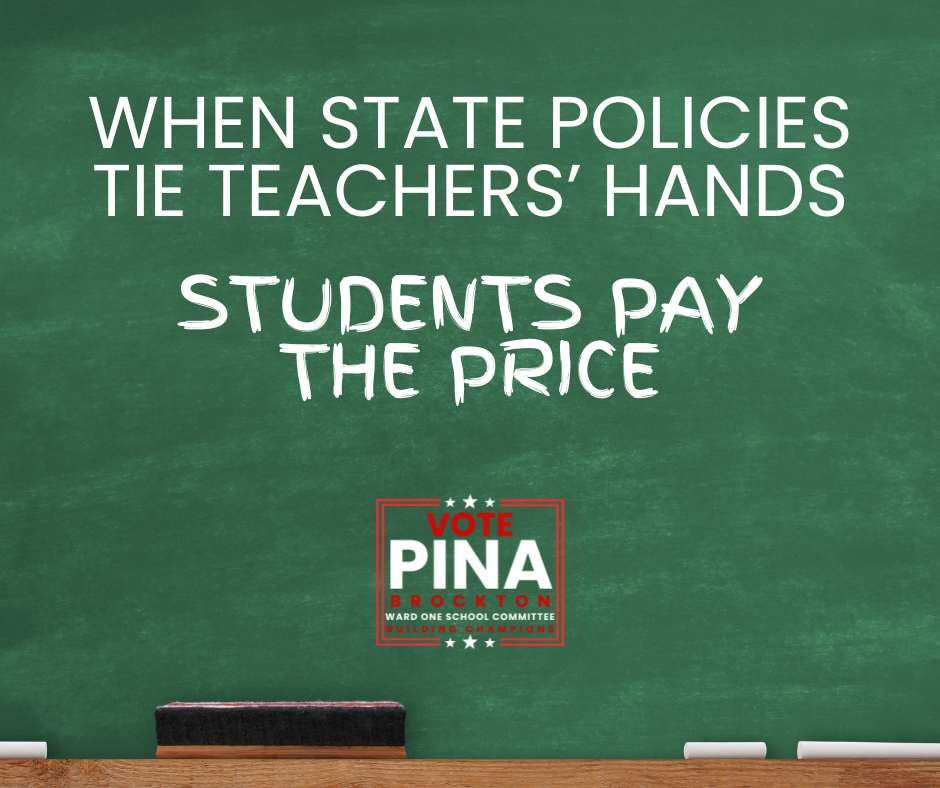Discipline in our schools isn’t just a local issue — it’s a state issue.
In Massachusetts, Chapter 222 of the Acts of 2012 and subsequent amendments in 2018 (effective in the 2024–2025 school year) changed the way schools are allowed to discipline students, especially those with Individualized Education Programs (IEPs) and 504 plans. These policies from the Department of Elementary and Secondary Education (DESE) were meant to reduce suspensions and protect student rights.
On paper, that sounds good. In practice, it’s creating classrooms where teachers are left powerless to deal with chronic disruption — and where every other child’s right to learn is sacrificed.
The Problem With Chapter 222
Chapter 222 was supposed to promote fairness in discipline, but the unintended consequences have been devastating for districts like Brockton.
- Teachers report being unable to suspend or remove chronically disruptive students, even after repeated defiance or dangerous behavior.
- Administrators fear violating DESE rules, so they push staff to keep disruptive students in the classroom at all costs.
- As a result, classrooms are destabilized: one or two students can hijack the lesson, while twenty others lose valuable learning time.
The 2018 amendments, which went into effect this past school year, tightened restrictions even further by requiring additional documentation, alternative education options, and parental notification before many suspensions can occur. Without the resources to provide those alternatives, schools are left with paperwork instead of solutions.
What the Research Shows
This isn’t just anecdotal. Research confirms what Brockton teachers already know: consistent and enforceable discipline policies are critical to learning.
- A study in the American Educational Research Journal found that inconsistent enforcement of discipline erodes school climate and academic outcomes (Gregory et al., 2017).
- Research in Educational Evaluation and Policy Analysis showed that when teachers lose authority, both student achievement and classroom safety decline (Skiba et al., 2014).
The reality is simple: students learn best in safe, orderly classrooms. That requires both compassion and consequences.
This Isn’t About Vilifying Students With IEPs
Let’s be clear: supporting students with disabilities is essential. But supporting doesn’t mean excusing. When state policy turns into a shield for repeated disruption, it undermines the education of every other child in the room — including students with disabilities who are trying to learn.
We can do both:
- Provide real services and supports for students with IEPs.
- Hold all students to clear, enforceable standards of behavior.
My Plan
If elected to the School Committee, I will:
- Push back on unfunded mandates. Brockton cannot continue absorbing costly DESE rules without state funding to match.
- Restore common-sense flexibility. Teachers and administrators need the authority to address chronic disruption without fear of violating Chapter 222.
- Strengthen support services. Students with IEPs should receive the services they’re entitled to, but they must also be held accountable for their behavior.
- Publish discipline data. Parents deserve transparency on how state mandates affect discipline, suspensions, and classroom safety in Brockton.
The Bottom Line
Brockton families send their kids to school to learn, not to lose hours of instruction because discipline policies are written for Beacon Hill, not Brockton classrooms.
We can protect the rights of students with disabilities and the rights of every other student. But it starts with restoring local authority, accountability, and common sense.
Our teachers deserve the tools to lead, and our children deserve schools where safety and learning come first.


0 Comments